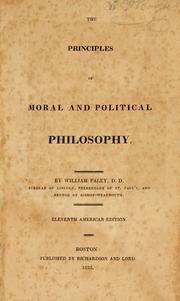Book II Moral Obligation
Chapter 4 The Will of God
As the will of God is our rule; to inquire what is our duty, or what we are obliged to do, in any instance, is, in effect, to inquire what is the will of God in that instance? which consequently becomes the whole business of morality.
Now there are two methods of coming at the will of God on any point:
I. By his express declarations, when they are to be had, and which must be sought for in Scripture.
II. By what we can discover of his designs and disposition from his works; or, as we usually call it, the light of nature.
And here we may observe the absurdity of separating natural and revealed religion from each other. The object of both is the same—to discover the will of God—and, provided we do but discover it, it matters nothing by what means.
An ambassador, judging by what he knows of his sovereign’s disposition, and arguing from what he has observed of his conduct, or is acquainted with of his designs, may take his measures in many cases with safety, and presume with great probability how his master would have him act on most occasions that arise: but if he have his commission and instructions in his pocket, it would be strange not to look into them. He will be directed by both rules: when his instructions are clear and positive, there is an end to all further deliberation (unless indeed he suspect their authenticity): where his instructions are silent or dubious, he will endeavour to supply or explain them, by what he has been able to collect from other quarters of his master’s general inclination or intentions.
Mr. Hume, in his fourth Appendix to his Principles of Morals, has been pleased to complain of the modern scheme of uniting Ethics with the Christian Theology. They who find themselves disposed to join in this complaint, will do well to observe what Mr. Hume himself has been able to make of morality without this union. And for that purpose, let them read the second part of the ninth section of the above essay; which part contains the practical application of the whole treatise—a treatise which Mr. Hume declares to be “incomparably the best he ever wrote.” When they have read it over, let them consider, whether any motives there proposed are likely to be found sufficient to withhold men from the gratification of lust, revenge, envy, ambition, avarice; or to prevent the existence of these passions. Unless they rise up from this celebrated essay, with stronger impressions upon their minds than it ever left upon mine, they will acknowledge the necessity of additional sanctions. But the necessity of these sanctions is not now the question. If they be in fact established, if the rewards and punishments held forth in the Gospel will actually come to pass, they must be considered. Such as reject the Christian Religion, are to make the best shift they can to build up a system, and lay the foundation of morality, without it. But it appears to me a great inconsistency in those who receive Christianity, and expect something to come of it, to endeavour to keep all such expectations out of sight in their reasonings concerning human duty.
The method of coming at the will of God, concerning any action, by the light of nature, is to inquire into “the tendency of the action to promote or diminish the general happiness.” This rule proceeds upon the presumption, that God Almighty wills and wishes the happiness of his creatures; and, consequently, that those actions, which promote that will and wish, must be agreeable to him; and the contrary.
As this presumption is the foundation of our whole system, it becomes necessary to explain the reasons upon which it rests.
William Paley. The Principles of Moral and Political Philosophy (1785)
The copyright to this edition, in both print and electronic forms, is held by Liberty Fund, Inc.

Ei kommentteja:
Lähetä kommentti